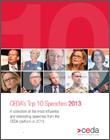PROGRESS 2050: Toward a prosperous future for all Australians
13/02/2017
CEDA’s Top 10 Speeches 2013
CEDA's Top 10 Speeches for 2013, in chronological order, are as follows:
 | State of the Nation address – Prime Minister of Australia, the Hon. Tony Abbott Women in Leadership: A human rights perspective – President, Australian Human Rights Commission, Professor Gillian Triggs; From mining boom to dining boom – Founder, Julian Cribb & Associates, Julian Cribb Australia: Ideas for a big future – Managing Director, Microsoft Australia, Pip Marlow Australia Adjusting – 27th Prime Minister of Australia, the Hon. Julia Gillard Securities Derivatives Regulation: Developments in the US – Managing Director and Chairman (Governance and Markets), Promontory Financial Group and former Chairman, US Securities and Exchange Commission, Mary Schapiro Missed opportunities in our Asian engagement – Chairman, The Future Fund and Chancellor, University of NSW, David Gonski AC The future of manufacturing in Australia: Innovation and productivity – Chair, Advanced Manufacturing Council, SA Department of Manufacturing, Innovation, Trade, Resources and Energy, Professor Göran Roos Transforming the Australian Army: A case for gender equity – Chief of Army, Australian Army, Lieutenant General David Morrison AO The US approach to monetary policy and economic growth – President and CEO, Federal Reserve Bank of Dallas, Richard W Fisher |
